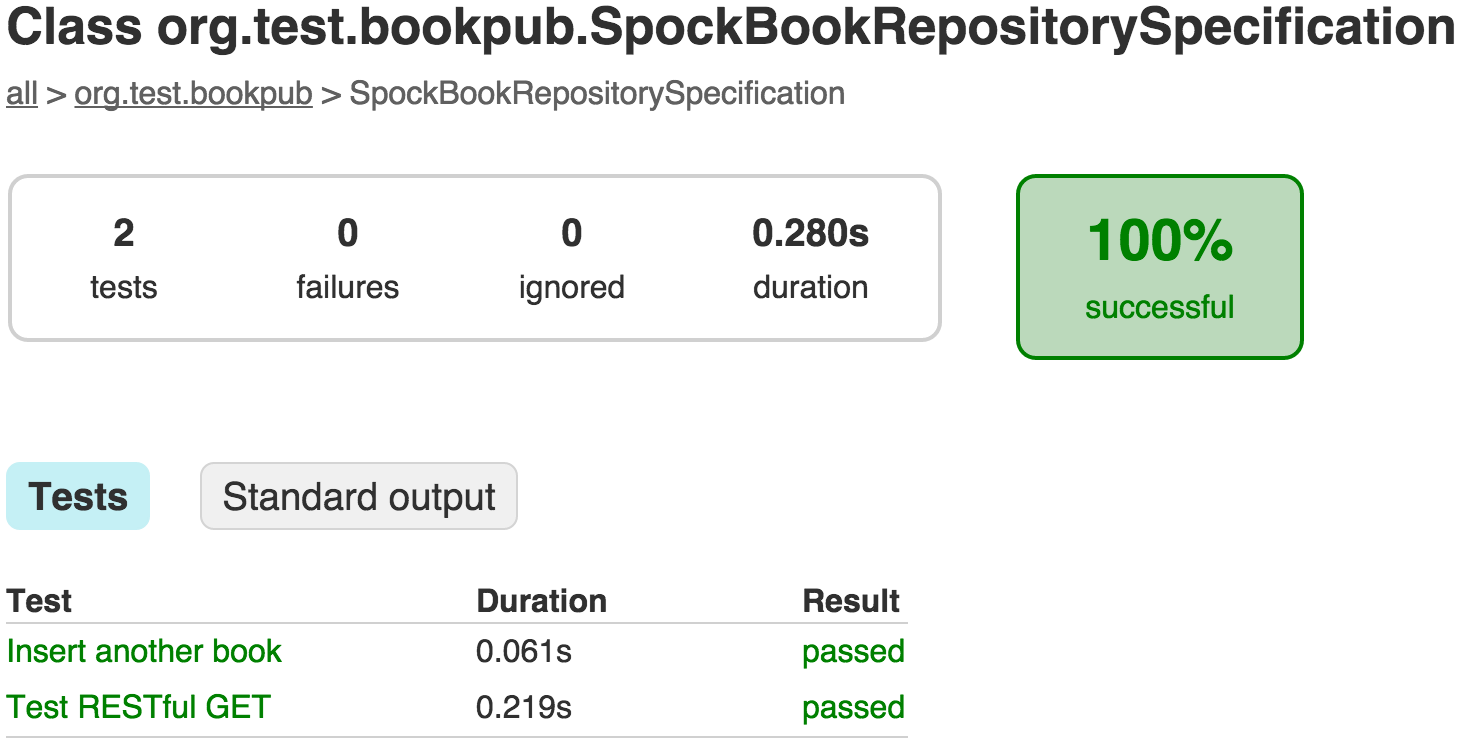- In order to add the Spock tests to our application, we will need to make a few changes to our build.gradle file first. As Spock tests are written in Groovy, the first thing to do is add a groovy plugin to our build.gradle file, as follows:
apply plugin: 'java'
apply plugin: 'eclipse'
apply plugin: 'groovy'
apply plugin: 'spring-boot'
- We will also need to add the necessary Spock framework dependencies to the build.gradle dependencies block:
dependencies {
...
testCompile('org.spockframework:spock-core:1.1-groovy-2.4-rc-2')
testCompile('org.spockframework:spock-spring:1.1-groovy-2.4-rc-2')
...
}
- As the tests will be in Groovy, we will need to create a new source directory for the files. Let's create the src/test/groovy/com/example/bookpub directory in the root of our project.
- Now we are ready to write our first test. Create a SpockBookRepositorySpecification.groovy file in the src/test/groovy/com/example/bookpub directory at the root of our project with the following content:
package com.example.bookpub;
import com.example.bookpub.entity.Author;
import com.example.bookpub.entity.Book
import com.example.bookpub.entity.Publisher
import com.example.bookpub.repository.BookRepository
import com.example.bookpub.repository.PublisherRepository
import org.mockito.Mockito
import org.springframework.beans.factory.annotation.Autowired
import org.springframework.boot.test.autoconfigure.web.servlet.AutoConfigureMockMvc
import org.springframework.boot.test.context.SpringBootTest
import org.springframework.boot.test.mock.mockito.MockBean
import org.springframework.jdbc.datasource.init.DatabasePopulatorUtils
import org.springframework.jdbc.datasource.init.ResourceDatabasePopulator
import org.springframework.test.web.servlet.MockMvc
import org.springframework.transaction.annotation.Transactional
import org.springframework.web.context.ConfigurableWebApplicationContext
import spock.lang.Specification
import javax.sql.DataSource
import static org.hamcrest.CoreMatchers.containsString
import static org.springframework.test.web.servlet.request.MockMvcRequestBuilders.get
import static org.springframework.test.web.servlet.result.MockMvcResultMatchers.content
import static org.springframework.test.web.servlet.result.MockMvcResultMatchers.status;
@SpringBootTest
@AutoConfigureMockMvc
class SpockBookRepositorySpecification extends Specification {
@Autowired
private ConfigurableWebApplicationContext context
@Autowired
private DataSource ds;
@Autowired
private BookRepository repository;
@Autowired
private MockMvc mockMvc;
void setup() {
ResourceDatabasePopulator populator =
new ResourceDatabasePopulator(
context.getResource("classpath:/packt-books.sql"));
DatabasePopulatorUtils.execute(populator, ds);
}
@Transactional
def "Test RESTful GET"() {
when:
def result = mockMvc.perform(get("/books/${isbn}"));
then:
result.andExpect(status().isOk())
result.andExpect(
content().string(containsString(title))
);
where:
isbn | title
"978-1-78398-478-7"|"Orchestrating Docker"
"978-1-78528-415-1"|"Spring Boot Recipes"
}
@Transactional
def "Insert another book"() {
setup:
def existingBook =
repository.findBookByIsbn("978-1-78528-415-1")
def newBook = new Book("978-1-12345-678-9",
"Some Future Book", existingBook.getAuthor(),
existingBook.getPublisher()
)
expect:
repository.count() == 3
when:
def savedBook = repository.save(newBook)
then:
repository.count() == 4
savedBook.id > -1
}
}
- Execute the tests by running ./gradlew clean test and the tests should get passed.
- As Spock integrates with JUnit, we can see the execution report of the Spock tests together with the rest of our test suite. If we open build/reports/tests/index.html in the browser and click the Classes button, we will see our specification in the table, as shown in the following screenshot:
- Selecting the com.example.bookpub.SpockBookRespositorySpecification link will take us to the detailed report page, which is as follows:
- Next, we will take our tests a bit further and explore the mocking functionality of the database repositories. Let's use PublisherRepository as our candidate to mock, and wire it into the BookController class to provide a getBooksByPublisher functionality. Let's add the following content to the BookController class in the src/main/java/com/example/bookpub/controllers directory at the root of our project:
@Autowired
private PublisherRepository publisherRepository;
@RequestMapping(value = "/publisher/{id}", method = RequestMethod.GET)
public List<Book> getBooksByPublisher(@PathVariable("id") Long id) {
Optional<Publisher> publisher =
publisherRepository.findById(id);
Assert.notNull(publisher);
Assert.isTrue(publisher.isPresent());
return publisher.get().getBooks();
}
- Let's add the following to the Publisher class in the src/main/java/com/example/bookpub/entity directory at the root of our project:
@OneToMany(mappedBy = "publisher")
@JsonBackReference
private List<Book> books;
- Lastly, let's add a getter and setter for the books to the Publisher entity class as well:
public List<Book> getBooks() {
return books;
}
public void setBooks(List<Book> books) {
this.books = books;
}
- With all the code additions completed, we are ready to add another test to the SpockBookRepositorySpecification.groovy file in the src/test/groovy/com/example/bookpub directory at the root of our project with the following content:
...
class SpockBookRepositorySpecification extends Specification {
...
@MockBean
private PublisherRepository publisherRepository
@Transactional
def "Test RESTful GET books by publisher"() {
setup:
Publisher publisher =
new Publisher("Strange Books")
publisher.setId(999)
Book book = new Book("978-1-98765-432-1",
"Mystery Book",
new Author("John", "Doe"),
publisher)
publisher.setBooks([book])
Mockito.when(publisherRepository.count()).
thenReturn(1L)
Mockito.when(publisherRepository.findById(1L)).
thenReturn(Optional.of(publisher))
when:
def result =
mockMvc.perform(get("/books/publisher/1"))
then:
result.andExpect(status().isOk())
result.andExpect(content().
string(containsString("Strange Books")))
cleanup:
Mockito.reset(publisherRepository)
}
}
- Execute the tests by running ./gradlew clean test and the tests should continue to get passed.


